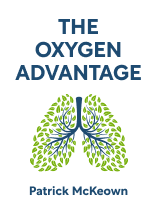

This article is an excerpt from the Shortform book guide to "The Oxygen Advantage" by Patrick McKeown. Shortform has the world's best summaries and analyses of books you should be reading.
Like this article? Sign up for a free trial here.
What is excessive breathing? How can breathing too much affect your quality of life?
In The Oxygen Advantage, Patrick McKeown asserts that breathing too much is a widespread habit degrading the health of almost everyone in modern society. Specifically, the average person inhales and exhales more frequently than they should.
Let’s break down what happens in your body when you breathe and how this changes when you breathe too much.
How Breathing Too Much Hurts You
Before getting into how excessive breathing is harmful, you need to understand how breathing works in your body. McKeown explains that breathing serves two main functions: taking in oxygen and expelling carbon dioxide. First, you inhale oxygen because the muscles and organs in your body need it to function. When you inhale, tiny air sacs inside your lungs called alveoli absorb oxygen and pass it into the bloodstream. Your circulatory system ensures that this oxygen travels to your muscles and organs.
(Shortform note: This biological information is necessary to understand specifically how smoking damages the lungs. As a cigarette burns, the chemicals inside melt together into a toxic tar that sticks to the alveoli in your lungs, killing their cells and destroying their ability to pass oxygen into the bloodstream. Since the lungs contain millions of alveoli, smokers can damage thousands of them before they notice the cumulative effect—but even if they can’t feel it, their lung tissue is being permanently damaged.)
Second, you exhale carbon dioxide because your digestive system produces more of it than your body needs as it breaks down food into energy. Additionally, your body generates a lot of carbon dioxide whenever you physically exert yourself, as a byproduct of intense muscle activity.
(Shortform note: Although we generate carbon dioxide (through digestion and physical exertion) and exhale it into the air, breathing and digestion don’t increase the amount of carbon in the atmosphere. The carbon we exhale is originally taken into the body through the plants and animals we eat, both of which absorb carbon from the atmosphere when growing (plants absorb carbon through photosynthesis, and animals absorb carbon from what they eat). In other words, we create a balanced cycle by eating carbon and exhaling it.)
Breathing More Blocks the Flow of Oxygen
Generally, the more oxygen your body sends to your various muscles and organs, the better they can do their jobs, asserts McKeown. However, breathing too much causes your muscles and organs to absorb less of the oxygen in your bloodstream, preventing them from working optimally.
When you breathe too much, you exhale large amounts of carbon dioxide, removing it from your blood. This is unhealthy because blood needs carbon dioxide in it to pass oxygen on to muscles and organs—a phenomenon called the Bohr effect. The less carbon dioxide there is in your blood, the less your body can access its blood oxygen.
(Shortform note: Ignorance of the Bohr effect and the belief that breathing more oxygen leads to a healthier body have led to the creation of “oxygen bars”—establishments that sell hits of air with higher oxygen content. Although proponents claim that pure oxygen can relieve stress and cure headaches, the Bohr effect implies that inhaling “purer” air with less carbon dioxide in it will actually result in your body utilizing less oxygen. Some experts agree with this idea, arguing that inhaling more oxygen in a setting like this will have no positive effect on your health.)
Many assume that breathing excessively is good for you because it increases the amount of oxygen you inhale into your body. However, McKeown contends that this extra oxygen doesn’t do you any good. In everyday life, your blood is almost always fully saturated with oxygen—it can’t hold any more, no matter how much you inhale. Unless your body is truly low on oxygen (for instance, if you’ve been intensely exercising or you have lung damage), breathing heavily vents carbon dioxide from your blood without impacting your blood oxygen level.
(Shortform note: Although inhaling more oxygen usually isn’t beneficial to your health, there are exceptions. In rare cases where people have chronically low blood oxygen levels—typically people with lung damage, as McKeown acknowledges—they can benefit from inhaling more oxygen. Doctors often prescribe these patients supplementary oxygen, delivered through a mask or tube. This oxygen is often particularly necessary during physical exertion, when the body uses up oxygen more quickly, or overnight, as some of the alveoli in the lungs deactivate while you sleep.)
The Vicious Cycle of Excessive Breathing
McKeown asserts that when you breathe too much, your body becomes accustomed to low levels of carbon dioxide, and you develop a hypersensitivity to it: Your brain sends you desperate signals to breathe harder in response to the slightest buildup of carbon dioxide, including any time you physically exert yourself. If you give into your brain’s signals and gasp for breath while exercising, you’ll exhale carbon dioxide that you need to oxygenate your body, resulting in swift full-body exhaustion.
This creates a vicious cycle, as the frequent impulse to breathe heavily causes you to constantly exhale, ensuring that your body is only accustomed to this low baseline of carbon dioxide.
(Shortform note: In Breath, James Nestor contends that the brain’s ability to change its tolerance to carbon dioxide in the blood served a key function in our evolutionary history. Once our ancestors developed the ability to automatically change their breathing instincts depending on how much carbon dioxide was in the air around them, they could adapt to the atmosphere at any altitude and live comfortably in more places. By this logic, the vicious cycle McKeown describes isn’t a biological glitch, but rather the body working as it’s intended—adapting permanently to new living conditions.)

———End of Preview———
Like what you just read? Read the rest of the world's best book summary and analysis of Patrick McKeown's "The Oxygen Advantage" at Shortform.
Here's what you'll find in our full The Oxygen Advantage summary:
- How proper breathing can help you lose weight, sleep better, and more
- How modern living conditions cause people to breathe too much
- Training exercises to help you breathe less and build CO2 tolerance






